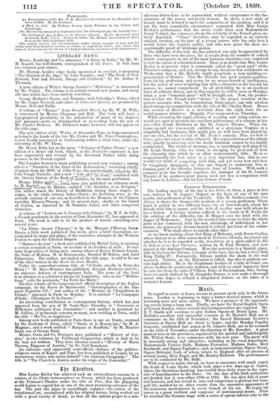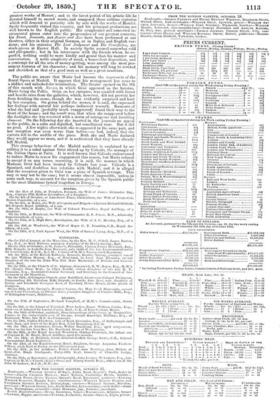Musir.
In regard to music at home, we can at present speak only in the future tense. London is beginning to have a winter musical season, which is becoming more and more active. We have a prospect of the approach- ing season beine a busy one. Firstly, we have the Royal English Opera at Covent Garden, where several interesting novelties are expected. Mr. E. T. Smith will continue to give Italian Operas at Drury Lane. Mr. Hullah's excellent and successful concerts at St. Martin's Hall are to commence on the 16th of November; the Sacred Harmonic Society's Oratories at Exeter Hall are about to begin; and the Monday Popular Concerts, established last season at St. James's Hall, are to be resumed on the 14th of November, under the direction of Mr. Benedict. A great musical tour in the provinces, organized by the spirited and indefatigable Mr. Willert Beale, is to commence with the new year. The party will be unusually strong and attractive ; including in the vocal department, Mademoiselle Victoire Balfe, Madame Fiorentini, Madame Badia, Herr Reichardt, and Signor Tagliafico ; and, as instrumentalists, Signor Sivori, Signor Bottesini (both of whom return to England after an absence of several years), Herr Engel, and Mr. Brinley Richards. The performances are to be conducted by Mr. Balfe. With respect to music abroad, we have to announce with much regret the death of Louis Spohr, which took place a few days ago at Cassel, where the illustrious musician has resided these forty years in the capa- city of kassellmeister to the Duke. On the date of his birth authorities are divided, but it was either 1780 or 1783. He has died full of years and honours, and has closed in ease and competence a glorious but tran- quil life, marked by no other events than the successive appearance of his numerous masterpieces in every branch of his art. He began his career as a great violinist and composer of instrumental music. Then he enriched the German stage with a series of operas inferior only to the
greatest works of Mozart ; and in the latest period of his artistic life he devoted himself to sacred music, and composed those sublime oratorios which will descend to posterity side by side with the works of Handel. Spohr frequently visited this country, and his principal productions are well known to the English public. His symphonies and concerted in- strumental pieces enter into the programmes of our greatest concerts; his Faust, lessondss, and Zemire and .Azar have been performed at our theatres, either in their original German, or in Italian and English ver- sions; and his oratorios The Last Judgment and The Crucifixion, are stock-pieces at Exeter Hall. In society Spohr seemed somewhat cold and phlegmatic; but in his intercourse with the friends whom he re- garded, nothing could be more kindly and genial than his manner and conversation. A noble simplicity of mind, a benevolent disposition, and a contempt for all the arts of money-getting, were among the most pro- minent features of his character ; and his memory will long be revered and cherished. as that of a good man as well as a great musician.



























 Previous page
Previous page